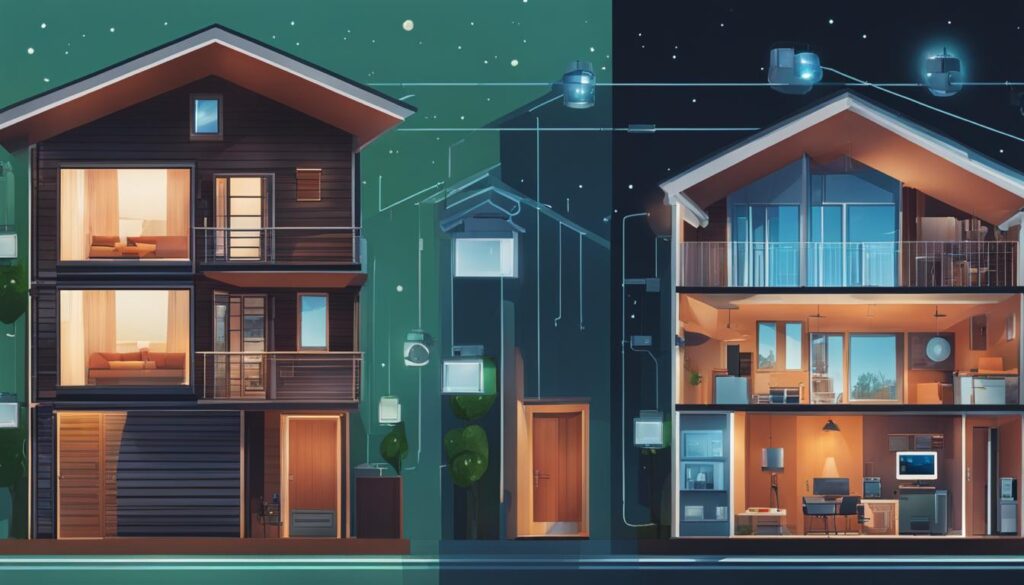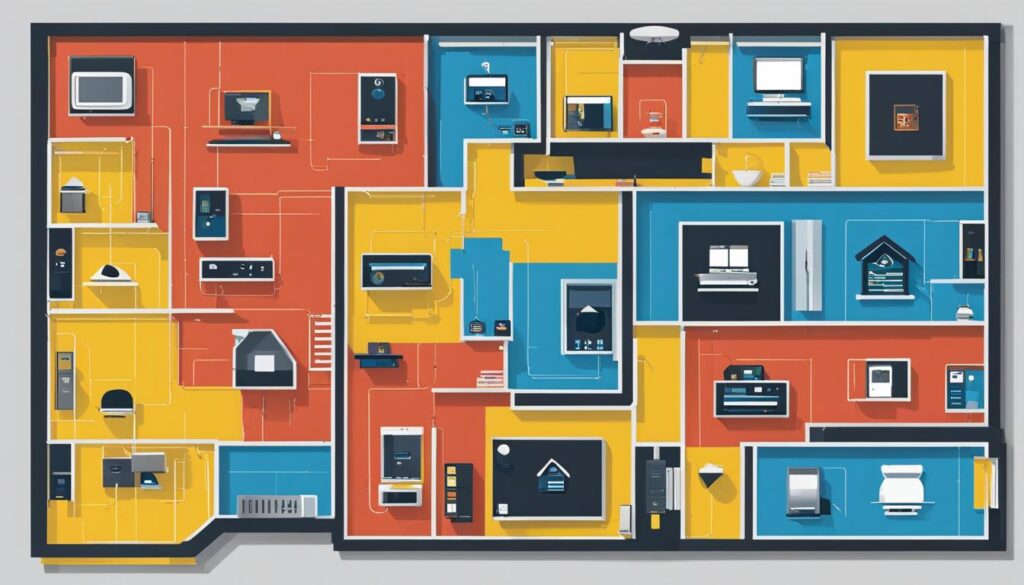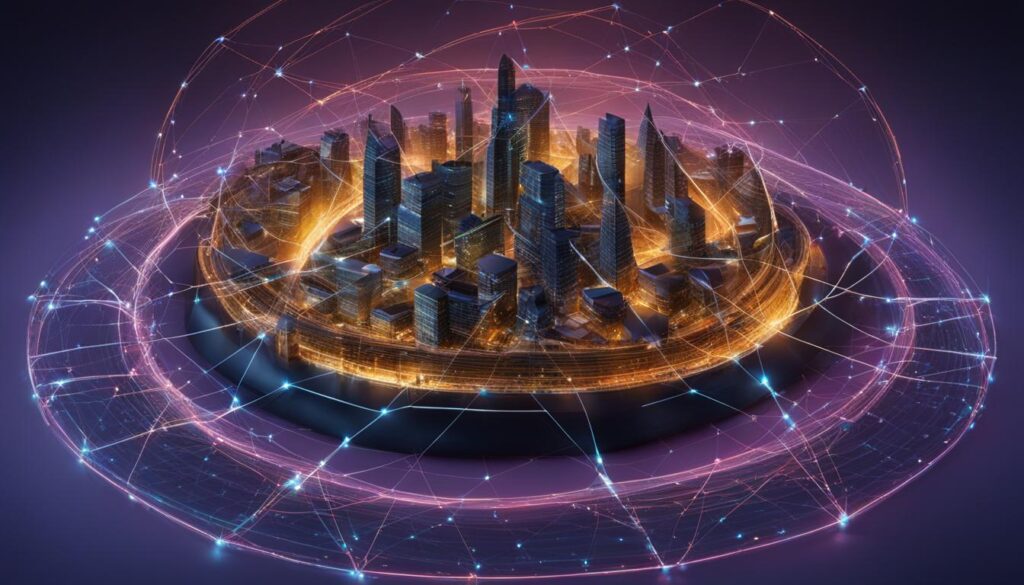Have you ever wondered if home automation and smart homes are the same thing? While the terms are often used interchangeably, there are distinct differences between the two. In this article, I will explain the disparities between home automation and smart homes, helping you understand their unique features and advantages.

Key Takeaways:
- Smart homes and home automation have some similarities but differ in their operation and level of control.
- A smart home is a technology-based system that allows remote control and monitoring of appliances, lights, thermostats, security systems, and more.
- Home automation refers to the process of controlling home systems through a centralized unit, aiming to make life more convenient and efficient.
- Smart homes use advanced technologies like devices, sensors, voice assistants, smart speakers, and artificial intelligence.
- Home automation allows users to control various aspects of their home without handling manual controls.
What Does Smart Home Mean?
A smart home is an automated dwelling that harnesses technology to provide convenience, comfort, and improved energy efficiency. It incorporates various types of devices, such as thermostats, cameras, lights, locks, alarms, and sensors that communicate with each other over a network. These devices can be controlled by the user via an app on a smartphone, tablet, or smartwatch, or through voice commands using virtual assistants like Google Home or Amazon Alexa.
Smart homes offer numerous advantages, making them increasingly popular among homeowners. First and foremost, smart homes provide unparalleled convenience. Users can remotely control various aspects of their homes, such as adjusting lights, regulating temperature, and managing alarm systems, with just a few taps on their smartphone. This level of control ensures that homeowners can create a comfortable and personalized living environment.
Energy efficiency is another major benefit of smart homes. Smart devices and sensors constantly monitor and analyze energy usage patterns within the home. Based on these insights, they can automatically adjust settings to optimize energy consumption, resulting in significant energy savings and reduced utility bills. Smart homes actively contribute to a sustainable lifestyle by minimizing waste and conserving resources.
But there’s more to smart homes than convenience and energy savings. Enhanced security is a key advantage offered by smart home technology. Motion detectors, cameras, and alarm systems can be seamlessly integrated into a smart home network, providing robust security features. Homeowners can monitor their homes in real-time, receive instant notifications of suspicious activities, and even remotely control security systems from anywhere in the world. This added layer of security and peace of mind is invaluable in today’s fast-paced and interconnected world.
“Smart homes provide unparalleled convenience, energy efficiency, and enhanced security.”
Overall, a smart home combines cutting-edge technology with everyday living, enabling users to control their homes effortlessly, save energy, and enjoy greater peace of mind. With the rapid advancement of smart home technology, the possibilities for improving and transforming our living spaces are virtually limitless.
What Does Home Automation Mean?
Home automation is the process of controlling various aspects of your home through a central unit. It gives you the ability to monitor and manage lighting, temperature and climate control, security and access systems, audio-visual equipment, and more, all from a single point of control.
Home automation systems typically consist of a central unit connected to different sensors throughout your house. This connectivity allows the central unit to interact with and control various parts of your home, creating a seamless and integrated experience.
There are several advantages to implementing home automation in your residence. Firstly, it offers convenience and ease of use. With home automation, you can automate certain functions and control them remotely, making your life more convenient and efficient. Whether it’s adjusting the temperature before you arrive home or turning off lights you forgot to switch off, home automation puts you in complete control.
Another advantage is customization. Home automation systems allow you to customize settings and schedules tailored to your individual needs and preferences. You can set up automated routines that align with your daily routine, creating a personalized environment that adapts to your lifestyle.
Furthermore, home automation can significantly improve energy efficiency. By monitoring and adjusting settings based on your behavior and preferences, home automation systems optimize energy usage, helping you save money on utility bills and reduce your environmental impact.
| Advantages of Home Automation |
|---|
| Convenience and ease of use |
| Customization tailored to individual needs |
| Improved energy efficiency and cost savings |
Implementing home automation in your residence offers numerous benefits, from the convenience of remote control to personalized customization to enhanced energy efficiency. With home automation, you have the power to create a smart and efficient home that fits your lifestyle.
Similarities and Differences Between Smart Homes and Home Automation
While smart homes and home automation share similarities, there are notable differences between the two.
The main distinction lies in the way they operate and the level of control they offer.
Smart homes use advanced technologies and connected devices to provide remote control and monitoring capabilities for various systems and appliances, making them more interactive and intelligent.
Home automation, on the other hand, focuses on integrating and customizing home systems through a central unit, allowing for automation and remote control. It emphasizes convenience and efficiency.
Smart homes require devices to be connected to the Internet and managed by a central server, enabling data transfer and control from anywhere.
Home automation systems activate the home’s functions through a central unit and a series of actuators installed directly in the home.
Here’s a comparison table outlining the differences between smart homes and home automation:
| Smart Homes | Home Automation |
|---|---|
| Utilizes advanced technologies and connected devices | Focuses on integrating and customizing home systems |
| Enables remote control and monitoring capabilities | Allows for automation and remote control |
| Requires devices connected to the Internet | Activates home functions through a central unit |
| Offers convenience and energy savings | Provides more control and allows for customization |

Exploring the Concept of Home Automation and Smart Homes
To fully understand home automation and smart homes, it’s important to explore their concepts and features. Home automation includes various devices and technologies that enable homeowners to monitor and control aspects of their homes from a single control point. It involves connecting devices such as thermostats, lighting fixtures, security systems, and appliances to a central unit.
On the other hand, smart homes incorporate technology-based systems to remotely control and monitor appliances, lights, thermostats, door locks, security systems, and more. Smart homes use advanced technologies like devices, sensors, voice assistants, smart speakers, and artificial intelligence to enhance convenience and efficiency.
Features of a Smart Home
A smart home offers a range of features that enhance comfort, convenience, and security:
- Remote Control: With a smart home, you can control various aspects of your home remotely using your smartphone or tablet. Whether it’s adjusting the thermostat, turning on lights, or checking security cameras, you have control at your fingertips.
- Voice Commands: Thanks to virtual assistants like Google Home or Amazon Alexa, you can control your smart home using voice commands. Whether it’s dimming the lights, playing music, or setting up automated routines, simply speak your commands and let your smart home take care of the rest.
- Automated Schedules and Rules: Smart homes allow you to create automated schedules and rules for your devices. For example, you can set your lights to turn on and off at specific times or have your thermostat adjust the temperature based on your preferences.
- Integration with Other Services: Smart homes can integrate with other services, such as music streaming platforms or weather information providers. This integration allows for seamless control and coordination between different aspects of your home.
Home automation and smart homes provide homeowners with the ability to customize their living environment, control energy usage, and increase security and comfort. Whether it’s remotely adjusting the temperature, monitoring security cameras, or automating daily routines, these technologies offer convenience and peace of mind.
| Home Automation | Smart Homes |
|---|---|
| Allows control of various home systems through a central unit | Utilizes advanced technologies like sensors, devices, and artificial intelligence |
| Offers convenience and customization | Enables remote control and monitoring of appliances, lights, and security systems |
| Can be controlled manually or with the help of a remote control device | Allows for voice commands and mobile app control |
| Aims to make life more convenient and efficient | Enhances comfort, energy efficiency, and security |
A table showcasing the differences between home automation and smart homes:
Understanding the concept of home automation and smart homes opens up a world of possibilities for creating a modern and connected living space. With the ability to control and monitor various aspects of your home with ease, you can truly personalize your living environment and enjoy the benefits of advanced technology.
What Sets Smart Homes Apart from Home Automation?
When comparing smart homes and home automation, it’s essential to understand the key differences that set them apart. While both concepts aim to provide convenience and control over various home systems, there are distinct factors that differentiate them.
Smart homes stand out with their focus on advanced technologies and connected devices. They offer a seamless experience through features like voice commands, smartphone apps, and automated schedules. With the ability to control appliances, lights, thermostats, and security systems remotely, smart homes provide unparalleled convenience and flexibility.
Moreover, smart homes excel in integration and customization options. They seamlessly integrate with other services and devices, allowing users to create a holistic and personalized environment. Whether it’s connecting with music streaming services or integrating with weather information, smart homes go beyond the conventional home automation experience.
On the other hand, home automation primarily emphasizes centralized control and customization of specific home systems. While it also enables remote access and automation, home automation systems require more installation and setup work. Typically controlled through a central unit, home automation can manage lighting, heating/cooling, curtains, blinds, appliances, and security systems.
Ultimately, the choice between a smart home and home automation depends on individual needs, preferences, and the desired level of control and customization. Whether you prioritize advanced technologies and connectivity or prefer the centralized management of specific systems, both options offer unique advantages to enhance your home living experience.
FAQ
Is home automation the same as a smart home?
While the terms are often used interchangeably, there are key differences between home automation and smart homes.
What does smart home mean?
A smart home is a technology-based system that remotely controls and monitors appliances, lights, thermostats, door locks, security systems, and other amenities.
What does home automation mean?
Home automation refers to the process of controlling home systems through a central unit, either manually or with the help of a remote control device.
What are the similarities and differences between smart homes and home automation?
Smart homes and home automation share similarities but have notable differences in how they operate and the level of control they offer.
What is the concept of home automation and smart homes?
Home automation and smart homes involve controlling and monitoring various aspects of a home through technology-based systems and devices.
What sets smart homes apart from home automation?
Smart homes use advanced technologies, connected devices, and remote control capabilities, while home automation focuses on centralized control and customization of specific home systems.
Source Links
- https://www.maiortvlift.com/lifestyle/decor-and-design/smart-home-vs-home-automation-understanding-the-key-differences/
- https://www.1control.eu/blog/en/smart-home-or-home-automation-a-journey-between-differences-and-advantages/
- https://www.connectedhomenc.com/post/2019/04/04/smart-home-vs-home-automation




